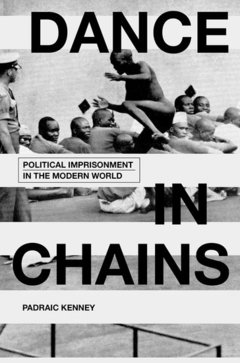Dance in Chains Political Imprisonment in the Modern World
Langue : Anglais
Auteur : Kenney Padraic

What is it that political prisoners do? What part does the imprisoned activist play in the conflict between regimes and their opponents around the world? Why, in short, are there political prisoners? The answers to these questions may seem obvious, as political incarceration today seems to offer the clearest evidence of a repressive regime, and of a determined political opposition. Yet surely there are more effective alternatives, for both states and their opponents, than incarceration. Imprisoned opponents, like those of the African National Congress in South Africa, or of Solidarity in Poland, or of the Irish Republican Army in Northern Ireland --just to mention a few examples from the last quarter-century--may eventually claim or share power, while those who are executed or exiled will not pose the same threat. From the opposition's point of view, in turn, imprisonment, even though it deprives the movement of a valued contributor, is often a badge of honor, and central to the story of contestation with the regime. So does prison contribute to the struggle, or is it a hindrance? Remarkably, the political prisoner has never received attention as a historical actor, our perceptions of them awash in clichés and archetypes. We think immediately of Nelson Mandela, or perhaps Václav Havel: good men, engaged in a moral struggle against bad regimes. But can that really be an acceptable definition, when Adolph Hitler too was a political prisoner? Can we understand what political prisoners are and what they do if we do not include those whose goals or ethics are different from our own? Dance in Chains--the title inspired by a song composed by a socialist on death row in a Warsaw prison 120 years ago--draws upon research in Poland, Ireland, South Africa and includes over a dozen different regimes over the last 150 years. These cases are not primarily comparative, but serve as pillars holding up a global investigation of the phenomenon. In each case, generation after generation of political opponents has gone to prison since at least the turn of the twentieth century. Yet they also vary widely, as regimes ranging from communist to fascist to colonial to democratic has imprisoned an equally wide range of opponents. Taken together, they yield a sufficiently wide spectrum to allow the reader to understand one of the central characters of modern political history.
Padraic Kenney is Professor of History and International Studies at Indiana University. He is the author of The Burdens of Freedom: Eastern Europe since 1989, A Carnival of Revolution: Central Europe, 1989, and Rebuilding Poland: Workers and Communists, 1945-1950. He has served as president of the Association for Slavic, East European, and Eurasian Studies.
Date de parution : 11-2017
Ouvrage de 344 p.
23.6x16.3 cm
© 2024 LAVOISIER S.A.S.



